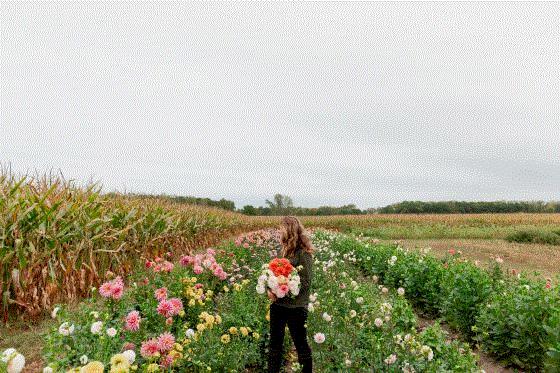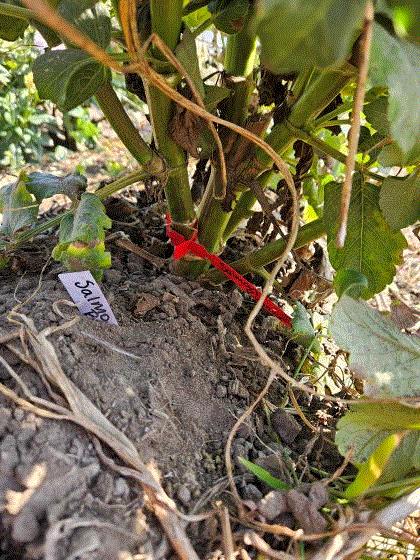October Farm Update

We grew a lot of dahlias this season. This is one of the many harvests from our farm.
We had our first patchy frosts last week. Tater and I live off-site, but the farm is only a seven-minute drive from our home. The weather forecasters projected the low temperatures to stay above 40F last week, so needless to say, I was surprised to find the dahlia field kissed with frost. This is exactly why I have trust issues! It only takes a slight frost to heavily damage the plants and it was a still morning. Without the wind, the few frost crystals that were in the air could settle and curtail our dahlia season. Other flowers in the field, such as the marigolds, statice, strawflower, sorghum and cosmos, were unphased by it. Tater and the Forget Me Not crew will comb over the outdoor fields one more time on Monday. Lows are expected to be in the mid-30s F for the first half of this week, and that will take all of our outdoor production fields out of commission. I was really hoping for a week’s worth of dahlia harvest, but sadly, I am not in control of the weather.
Overall, we had a great dahlia season; we really scaled up production, and now we have to scale up the dahlia digging process (more on this later). I always have mixed feelings when we start putting the field to bed—a blend of relief and also sadness. As much as I get annoyed with the dahlias over the course of a season, I really miss them when they are finally finished.
But it is a welcome change of pace, since our production will be limited to the greenhouses from now on. In the coming weeks we will be cutting heirloom chrysanthemums, stock, snaps and some indoor dahlias. Then we will shift our focus to field clean up and dividing dahlias. And we will pepper in some professional development along the way, because one of my many goals for this winter is to invest in staff training.
In this edition of Bloom Beat we will be talking about dahlia digging, greenhouse technician certification, webinars and more! With all that being said, lets talk shop!

Great Dahlia Dig of 2024

Tater and I are going to miss the dahlias, but it's time to move on to the next crop.
With the impending curtain call for dahlia season being this week, Tater and I decided to finalize our game plan for getting these dahlias out of the field. Hopefully you can glean some insight from our master plan to help you keep track of your own dahlias for next spring.
I’ve debated just purchasing new dahlias every season. Tubers cost around $2 wholesale; it could make a lot of sense to forego digging altogether, especially if we are not selling tubers and if we account for the opportunity cost—what else could the employees and I be doing? But I value the control of our own dahlia inventory. It seems each season, no matter what tubers or corms we order, our order gets slash and modified at the last minute by suppliers. And the unicorn varieties (such as Peaches N’ Cream, Coralie and many others) aren’t available in commercial quantities. At the end of the day, we decide to dig our tubers each season and store them on our farm.
When we were growing only a couple thousand tubers, we would mow the dahlias back with hedge shears and hand-dig them each season. It was quite the undertaking, but we could manage. This season, we grew half an acre of dahlias, so needles to say, we needed to mechanize. The great news is that we had a game plan last fall before we even put the first tuber in the ground this spring.
This season, we are labeling each variety with two tags: one wrapped around the base of the tuber at the start of each variety and the other a free-standing tag right next to it. We will mow the tops of the dahlias with a brush hog on the back of a tractor. We will lift them out of the ground with a single-row potato digger.

Last October, I found a SP50V Checchi & Magli potato digger (see image below) at a local farm auction. Honestly, I think this might be one of the best things I have ever bought, because it's going to save us a ton of work! The tractor will straddle the row of dahlias, and the potato digger will gently lift and shake the dahlias and bring them to the surface. We will then follow behind the tractor, pick up the tubers and meticulously label the crates.
I listened to the
Dirt on Flowers Podcast this week on this very subject. Lyndsay from
Wildroot Flower Company in Marietta, Ohio, is going to try an undercutter bar. Those are easier to come by than a potato digger. Who knows, maybe your farming neighbor down the road has one; if you have a tractor, this may be worth looking in to.
We divide our dahlias in the fall since we are so busy in early May with Mother’s Day and we need the tubers to be ready to get into the ground as soon as its warm enough, but you can wait until spring if you want the eyes to be more visible. Once we divide our tubers, we package them in sawdust and label the crates. We will put a label inside the crate as well as put a wrap-around label on each crate handle. We want to be able to identify each variety quickly once we get ready to plant next spring.
Another good purchase: We scored an old Kroger meat freezer a couple years ago. The walls are heavily insulated. We store our dahlia tubers in it and use an electric heater on a thermostat to make sure they do not freeze. We keep the room at 45F, which accounts for any cold spots.
Tater and I will give you a full report on how the great dahlia dig of 2024 goes in the next edition of
Bloom Beat. If you have any tips and tricks that you would like to share from your own farm, drop us a line at
ldaschner@ballpublishing.com. We would love to hear from you!

Mind Your Melon Webinar

Certified American Grown (CAG) is hosting a webinar on Farmer Mental Well Being. Farming isn’t for the faint of heart. It can be incredibly stressful and isolating, especially in the early years starting your farm.
According to a CDC (Center for Disease Control and Prevention) report in 2018, 32.2 male agriculture workers per 100,000 died by suicide between 2012 and 2015. This is drastically higher than the national average suicide rate for men of 20 per 100,000. Long story short, suicide is a major problem in the agriculture industry!
CAG is partnering with
Mind Your Melon for a webinar on farmer mental well being. Marshall Sewell, founder of Mind Your Melon, works with farmers and ranchers to promote mental wellbeing, counseling and tips for stress relief. Marshall grew up on a fruit and vegetable farm in Plant City, Florida. His father committed suicide following a crop failure while Marshall was in high school. Marshall and his wife, Taylor, are making it their mission to help save farmers from themselves and combat the stigma that surrounds mental health.
The webinar is Tuesday October 22 at 2 p.m. Eastern time.
The mental health of my fellow farmers is a topic near and dear to me, and I really hope you will make the time to attend. To learn more about Mind Your Melon, check out their website and register for the webinar
HERE.
Thank you, Certified American Grown, for putting this together. I really appreciate it!

Greenhouse Technician Certification by AmericanHort
Earlier this year, AmericanHort launched their new
Greenhouse Technician Certification program. Tater and I want to offer training curriculum for our team over the winter months, and this program seems to be a promising solution.
Ken Fisher, CEO of AmericanHort, states, “This is a significant opportunity for our community to foster a deeper understanding of greenhouse operations. The objective of this certification is to provide useful tools for greenhouse owners to use in training their associates and provide growers with the practical knowledge and skills they need to succeed on he job. We are expanding future certification programs to cover all industry segments addressing the crucial training needs of the horticulture sector.”
Topics in this course include: plant anatomy, plant nutrition, soil taxonomy, fundamentals of pest management and more! This self paced,
online course offers video demonstrations from seasoned industry experts. Once the course is completed, the certificate is valid for two years and must be maintained by educational credits through AmericanHort.
Unfortunately, I have yet been able to find training specific to cut flower production, but there is a reasonable amount of overlap between bedding plant production and cut flowers. Maybe this something the Association of Specialty Cut Flower Growers (ASCFG) can create: an industry standard training program.
In the meantime, the folks at AmericanHort have a curriculum that Tater and I can start using for our team. We would love to hear what you use for training your team, and if there is something more cut flower-specific? Drop us a line at
ldaschner@ballpublishing.com. For more information about the greenhouse technician certification check out this
LINK.

Weed Management Course for Greenhouse and Nursery
Speaking of training, the University of Florida Greenhouse Online Training Program is launching their weed management course this week! The class starts on October 14 and ends on November 8. Dr. Chris Marble, associate professor of ornamental and landscape weed management at the University of Florida, will be teaching the course. Upon completion, students will be able to manage all aspects of weed management, factors that impact weed growth and herbicide performance, as well as how to accurately calibrate sprayers to avoid crop injury. The course is available in English and Spanish.
The University of Florida, in partnership with American Floral Endowment, have multiple courses that you can purchase ala carte. Topics range from nutrient management to field diagnosis of plant diseases and much more. Check out their full course offering
HERE.
Enthusiastically!
Lindsay Daschner (and Tater)
Editor-at-Large—Bloom Beat
Owner—Forget-Me-Not Farms
This email was received by 6,307 of your fellow fresh-cut flower growers!
If you're interested in advertising in Bloom Beat, contact Kim Brown and she will hook you up!